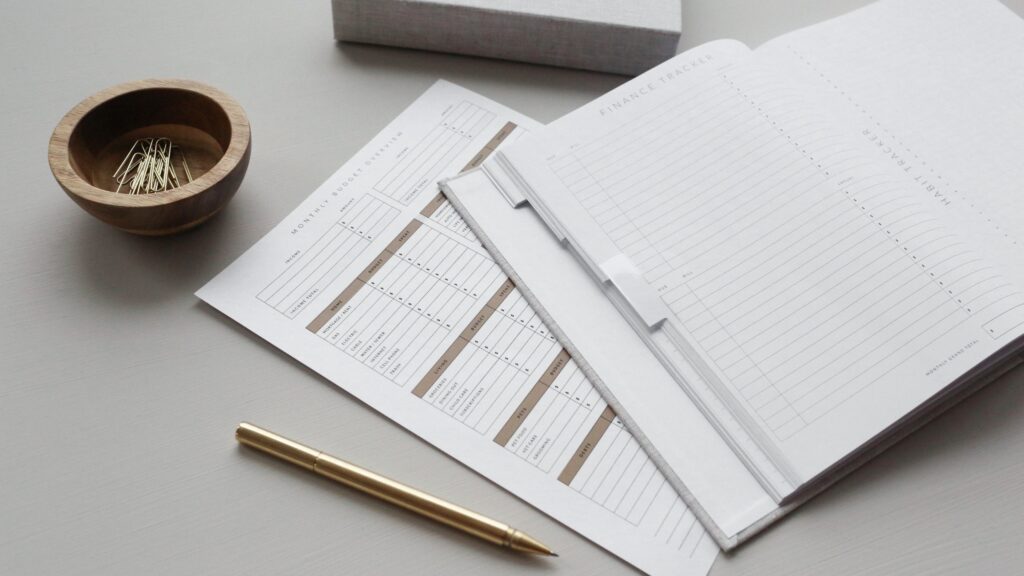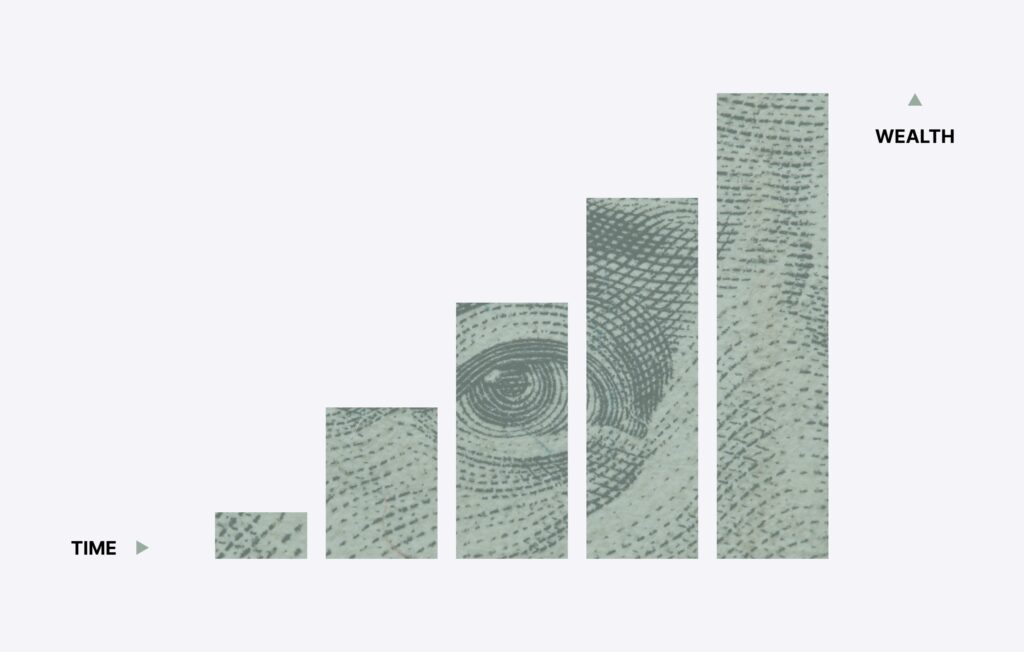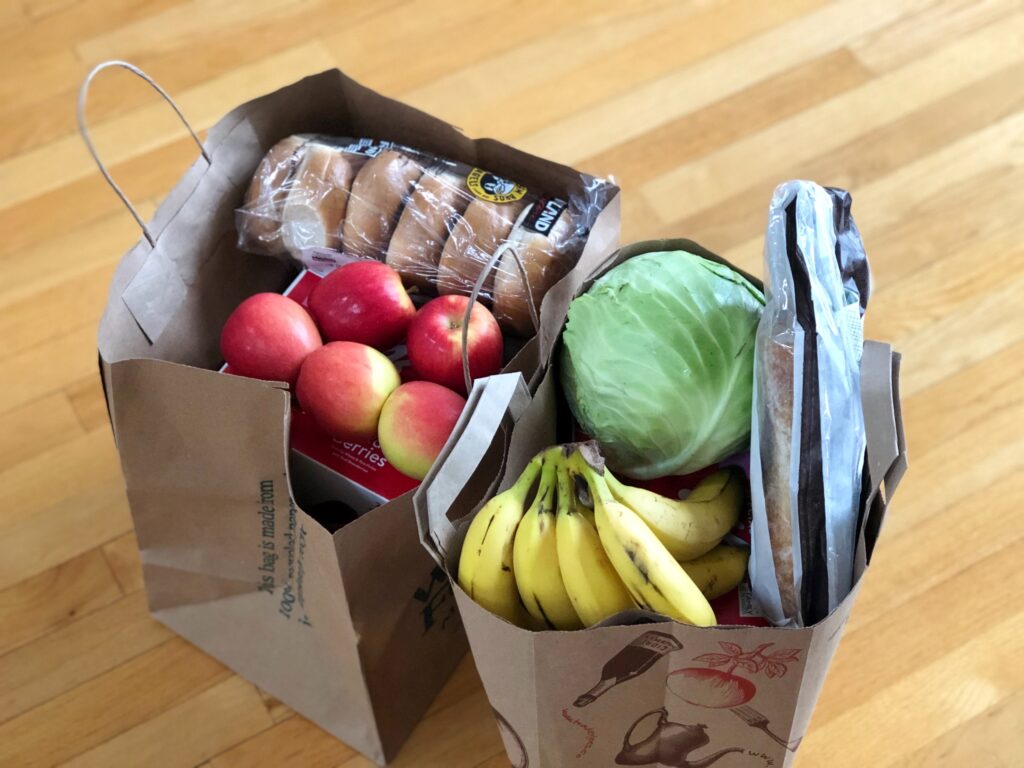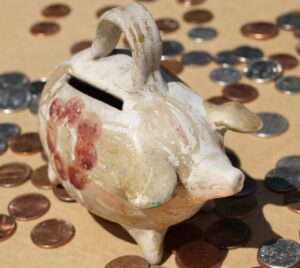Sometimes I have to step back and realize not everything needs to be or can be measured with dollar signs. Money is a tool to create the life we live, nothing more. At the foundation of it all, life should be about living the life you have envisioned for yourself, not an inherent obsession with accumulating wealth. If that is your thing then sure, you do you. But when it comes down to fundamentals, money is just a concept; it will not live your life for you.
Envisioning the life you want is the first step towards fulfillment. After all, when you have no goals to reach for, you will not know when you have made it. The goalposts are different for everyone of course, that is where “personal finance” comes into play. I cannot tell you what your ideal life is, only give illustration into mine.
In my ideal world, I am at my peak physical health with a loving wife and son whom I get to spend my time with. Simple as that. I don’t need fancy cars or houses. I only want to live a long life with my family, exploring the world together.
Now obviously nothing in this world is free. I have to find a way to fund this lifestyle somehow. This brings us back to “personal finance.” As all our goals are different, there will be different paths and different resources necessary to fulfill each and every one of our lives. This is not about living on as little money as possible, this is about allocating our money to what is important and what brings us the most fulfillment.
Finding your Why
It took me quite some time to find the “why” behind my goals. I had incredibly ambitious goals when I was younger with absolutely no plan to get there. Even worse, I had no reason why I had these goals. Years later, after the birth of my son, I finally found it: to provide a rich and fulfilling life for my family. You need to find your “why” if you want any of this to work.
Why are you reading this right now? You took time out of your busy day to read this, so there is certainly an inherent desire in you to do better. Do you have goals to travel the world? To provide a long and happy life to your family? To sit around all day and play video games? Whatever you are looking for deep down, that is what you need to focus on. Start with what you think you want, and then ask yourself why? Then ask yourself again. And again. Keep going until you have found your deepest, most natural desire inside of you.
For me it went something like this: I want to live frugally so that I can save a bunch of money. Why? So that I can retire early. Why? So I can spend my time how I want. WHY? So I can watch my son grow and experience the world together. WHY? Because I have a desire to give him the best possible life physically, emotionally, and financially. WHY?…
I could keep going but then we would be delving into my own personal therapy session. If you do not know your “why” that is okay, but until you take a look and find it you can only guess.

Creating a Budget
I know, it is the dreaded “B” word. But don’t worry! A budget is a tool, not a punishment. By organizing, compiling, and for some, taming their financial lives, we can ensure we are taking the correct steps towards what we actually care about. If you followed my advice above and found your why, then we have a solid objective behind your budget. If not that is fine too, our life goals are constantly changing so it is better to aim close than not at all.
The first step is to make a list of all your sources of income and amounts. If your income varies a bit due to changes in work hours in a week or commission, use the average minimum you will earn monthly. We will cover excess income later.
Now if you are like me, your income is fairly consistent and you have it easy on this part. Regardless, total your income at the top of a spreadsheet. Let me make a note here; you do not need to use a spreadsheet specifically. If paper is more your style, then use it. I am a big advocate of using the tools that work for you, so if spreadsheets aren’t your style then use what makes sense for you.
Next, go through your bank records and find each and every monthly (or more frequent) bill you are responsible for. Add these below your income in your spreadsheet in a new section. My list includes my mortgage, car insurance, utility bills, and streaming services. If the cost varies month to month, use the highest cost for the last year.
If you have any annual or quarterly bills (or any other strange period), add them below in a new section. Take these bills and divide by the months in between payments. For instance, if it is an annual bill divide by twelve, if it is a quarterly bill divide by three.
The next section is bills that while they do vary month to month, we have more control over. Grocery bills, transportation costs, food, and various purchases made on a whim. Use the highest expected cost for a month for each of these.
Great. Now subtract all of your bills from your income. Ideally you will have a nice chunk of change left over, but if not then we have identified a place for major improvement. Keeping your finances cashflow positive is the single biggest goal you need to have for your financial life. If you are not cashflow positive, then you will eventually delve into debt and as plenty of people have shown, uncontrollable spending will spiral out of control quickly.
Something I have done that I highly recommend is creating a separate bank account solely for paying bills out of. Set up an automatic transfer into this account every time you get paid and have your bills auto draft out of this account. If you base these transfers off the amounts above, you will accomplish two things. Your bills will be guaranteed to get paid, and you will start accumulating extra savings.
How is that? If you base the transfers off the highest expected payment per year instead of the average, you will be putting more than needed into this account, plus if you are paid weekly or biweekly, then occasionally you will have an extra paycheck in a month which means the entire transfer is excess. This is one of many steps I have taken to automate my finances.

More Month at the End of your Money
Let’s go with the worst case scenario first: you realize you spend far more than you earn in a month. Hopefully you were aware of this before now, but if not it is good to find out sooner than later. What is there to do? The honest truth is that you need to go into emergency mode; you are on a sinking ship without a life boat. If you are not working 40+ hours a week, get on it. If you are spending hundreds of dollars a month in fast food and take out, get on that personal chef diet. You owe it to yourself; not me, not your family, but yourself.
Take a second look (or first look if you have not been following along) at your bank statements for the past several months. Where exactly is your money going? You do not deserve to be killing yourself with debt by spending hundreds of dollars a year on television, streaming, internet, etc. That is nonsense. They know it as well. If you are like me and have a family relying on these services, pick out the essentials and cancel the rest.
If your situation is dire enough, cancel everything. Set aside an hour or two of your day and contact each service you absolutely cannot live without. A quick telephone call can be the difference in saving a few hundred dollars a month and drowning in debt. Even if you do not cancel, just by contacting them you can easily slash your bills in half.
If you smoke, drink, or have an expensive hobby, give considerable thought into quitting, or putting it on hold in the case of the hobby. The average cost of smoking a pack a day is a bit over $200 a month. If you drink a bottle of wine a week at home you spend about $130 a month. I have friends who have been known to drop hundreds of dollars a month on gaming equipment and virtual currencies, or building a collection such as watches or knives. Assuming you do all three, you could easily spend $400-500 a month on stuff you really don’t need.
Would an extra $500+ a month do you any favors? If that money was put towards your retirement for the next ten years, you would have roughly $100,000. Stretch that out to 30 years and you are looking at roughly $1,150,000. Is your arbitrary pastime or vice worth giving up a future of luxury? I am not suggesting you give up everything you spend money on if it truly makes you happy. I just want you to give considerable thought as to whether you are truly happy because of it and not just passing the time.
Once you are done trimming the fat out of your budget, what next? Take a look at your essential bills. Mortgage, rent, utilities, transportation. Are you living somewhere too expensive? Either get a roommate(s) or move. Are you blasting the air conditioner constantly with all your windows open? Do the planet and your wallet a favor and cut that out. Are you making payments on a sixty thousand dollar truck because you occasionally need to haul things? Sell it and get a modest vehicle, or better yet get a bike.
You should now have a decent action plan for chopping down your monthly expenses. As you can imagine there is still work to do. Cutting down expenses can only take you so far; you need to increase your income. If your current job(s) offer overtime, take it. If you only have a part time job, find another. If you are self-employed, wake up an hour or two earlier and grind it out. Until you are bringing in more money than you spend, you do not have time to sit around at home doing nothing.

More Money at the End of your Month
Bringing in more than you spend is a great position to be in, but we are just getting started. Our next goal is making sure we are saving enough for retirement. Whether this is in forty years or four, every cent counts. You do not want to wake up one day saying “if only.”
Are you saving enough already, or have a plan of action to get there? Great. Continue to work towards pushing your monthly expenses down and income up when and where possible. There is a critical point where, after accounting for retirement and expenses, you will have enough income coming in to fully support what you are truly looking for in life. For me personally, all I need is enough money to put food on the table, keep a roof over our heads, and a number of small luxuries occasionally that, while not entirely necessary, do bring my family great joy.
Entertainment
I am not much of a partygoer, but when I do decide to get into social situations I am sure to make the most of them. Rather than going out to a bar and spending ungodly amounts of money for one night, I would rather run to the store and pick up some drinks for the price of a couple beers at the local bar. If you get roped into going out or cannot live without the nightlife, there is no shame in sipping “mocktails” or making a drink or two last the night. Happy hours and other weekly specials are also good to plan around if possible.
Going out to the movies for a night has always been a favorite of ours. As you can imagine the snacks and drinks help to lighten the wallet more than I like. Rather than go for smaller portions for everyone, if you do not mind sharing then getting a larger size and splitting amongst yourselves is typically much more economical. Or better yet, drink and snack beforehand.
I absolutely love good food. I also love saving money. Unfortunately these are not entirely compatible statements, but we can make them work. Looking for weekly specials at your local restaurants is a sure fire way to save money and have a high quality meal. I tend to skip the appetizers and deserts unless it is a special occasion that warrants it. Going out to eat for breakfast or lunch also tends to be much cheaper so you can have a great experience without the great bill.
Groceries
This is the big one for most people, myself included. We tend to overbuy and overpay on groceries. Everything looks healthy and delicious, and we have such good intentions to use up everything we buy. Then a week or two later we are throwing out dozens if not hundreds of dollars in food.
Fortunately there are plenty of options here. The first step for every purchase always needs to be whether or not you will realistically use it up before it goes bad. My wife and I used to be horrible about buying sandwich supplies and completely forgetting about them until it was time to throw them out and buy more. The amount of bread I saw go into our trash always hurt, yet we bought more. Finally we put our foot down and told ourselves we either need to change our meal plans to include sandwiches or quit buying them.
You also need to ask if it is something you can live without. I have a new saying I have been telling myself lately: healthy people are rich people. If you love the candy isle, either cut it down to a minimum or limit yourself. If you cannot live without frozen meals like me, learn to make them yourself.
Are there any cheap alternatives to a weekly staple in your house? I have become a bit of a gym nut over the past few weeks, so like any new dude looking to bulk up I stocked up on all the “essential” protein shakes and accessories. After doing my research I decided to switch out my $100 plus monthly spending from weird powders to whole foods and milk. Shockingly, it is cheaper and no doubt much healthier.

Fixed Expenses
If you have stuck with me this long then we need to hit this category again. Your fixed expenses are likely the most difficult to change, but if you can do it then the reward is the greatest.
Give serious consideration to where you live. Can you move closer to where you work, or better yet work from home? It is always a good idea to try and live near where you work, however if your rent or mortgage doubles just to save five minutes then perhaps not. This is really a situation specific decision on the value of your time versus money.
If you like where you live, consider where you work. I recently got a job 27 miles closer to where I live. If we take what the IRS values that mileage at ($0.55 a mile), I am saving $7,425 a year in repairs and maintenance to my car. Not to mention, I now have over an hour and a half of each work day freed up from commuting and instead I can focus on other things such as working out and writing.
Speaking of commuting, what are you using to drive every day? While there is nothing necessarily wrong with driving a truck, luxury vehicle, or sports car, keep in mind the additional costs to own and maintain them. As I said above, the difference in a $200 a month car payment and a $700 car payment is $100,000 over 10 years, never mind the additional maintenance costs. Better yet, don’t carry a car payment and buy a used vehicle with cash.
Utilities
While it would be an interesting exercise in self punishment, living by candle light is obviously not practical. However there are some less painful ways we can save on our utilities.
For instance, during the day if you are out of the house, turn up the air conditioner. There is no sense in keeping the house perfectly comfortable if no one is there to enjoy it. You don’t have to go crazy with this; a few degrees goes a long way. I recommend buying a programmable thermostat if you do not already have one. Every day when we leave the house, our A/C sets itself five degrees higher and about an hour before we get back it moves back down.
We never notice a difference other than our lower electricity bill! Some people argue that the cost will be the same since your A/C has to work harder to get the temperature back down at the end of the day, however the problem with that is simply thermodynamics. The further you keep the temperature inside from where it is outside, the more energy is transferred through the walls and windows. So by lowering the difference throughout the day, you lose less energy per hour.
Taking advantage of the natural temperature outside is also incredibly useful. If you have sun facing windows, open the blinds to let the sun in and heat the house naturally. If you notice yourself kicking the blankets off at night, crack a window open and let out the heat. The biggest electrical expense households typically have is due to temperature regulation; doing some of the work for your air conditioner can go a long way towards saving money.
My wife has been on me about replacing our water heater tank with an electric tankless. Upfront they cost more, but they last five to ten years longer than a tank, never run out of hot water (a huge perk for my wife’s boiling showers), and are shockingly more energy efficient. If you own your home or are on good terms with your landlord, consider a discussion on upgrading yours when the tank has run its course.
While I won’t tell you to micromanage what lights are on or what is plugged in (unless you enjoy it), I would recommend looking at more energy efficient light bulbs and appliances when yours go out. It takes a bit of stress off of me knowing if I forget to turn off a light, it is only using a fraction of a penny an hour in electricity.
Of course there is a limit to this; you don’t need fancy color changing lightbulbs or a washing machine with Bluetooth (who uses that anyway?) You need to consider the upfront cost versus savings; I would never advocate spending thousands of dollars to save maybe a hundred a year.

Subscriptions
We managed to cut the (cable) cord years ago. Online streaming services have never been better. Fortunately neither my wife nor I care for most live shows, so we can get by on the free versions of television, Netflix, and a handful of other lookalikes. When we had our son for the first few months, I will admit I used the free channels our TV provided and watched all the Shrek movies on repeat for a solid two weeks. Who even knew there was a Shrek channel?
This is a dangerous game though. $12 here and $15 there eventually add up to nearly as much if not more than cable TV. We sit down every few months and discuss if we are getting our money’s worth out of each service. If we have any doubt, we cancel and see if we miss it. Better yet, use one service for a few months, cancel, and switch to the next. This way things stay fresh since you have an entirely new list of things to watch. Netflix is not going to refuse to let you pay them next month, I promise.
If you have jumped on the bandwagon of weekly meal boxes, I would love to hear about it in the comments below. I have been unable to justify the cost to myself. My recommendation here would be that unless the food is absolutely mind-blowing, I would order sparingly to learn new recipes. I have no doubt in my mind you could find fresher (and cheaper) ingredients at your local store than you will get in a box shipped to you.
This goes for all those subscription box services. I have a family member who bought the one for dog toys; while it is good to see what exactly your dog enjoys, at some point you will learn they hate these and love those. You don’t need a mix-matched box of toys every month if they only like a handful of them; just go buy what they like!
Luxury Spending
A coffee a day keeps your sanity… in check. This will be the most difficult category to push down. Fortunately you don’t need to trim everything if it brings you happiness. I brew myself coffee everyday and while I could save probably $30 a month if I just quit, it has become a very comfortable part of my routine. We also like to have one cheap take out meal a week on Fridays typically.
The point of this section is to know what is excessive and what is okay. If you are going to a coffee shop every day for a $7 latte then perhaps you need to learn to brew your own. If you order food daily, or heaven forbid two or three times a day, then you need to learn to cook. Don’t make these changes a chore; make them an enjoyable part of your day!
I used to despise making my own coffee because it honestly tasted like kerosene. Turns out I just needed nicer coffee beans and a little more practice. Same with cooking; I found a few recipes I enjoy making and have slowly refined them until I can make them without looking at the recipe. I managed to trade cheap retail coffee for rich homebrew, and greasy take out for high quality ingredients. Sure I could save more if I really wanted to, but these small changes are good for the mind, the wallet, and the body.
Do you have a particular vice you just cannot give up? Consider if your alternatives would be an enjoyable change rather than forcing yourself to fully cut things that make you happy from your life.

Live Your Life Your Way
The best part about budgeting isn’t saving money. Sure, keeping more of your money in your pocket is nice, but the real positive is that you learn a lot about yourself and what you really care about. It is all about striking a balance with yourself and finding the most happiness and fulfillment with an appropriate amount of spending.
You don’t have to nickel and dime yourself to save money. Money is a tool to bring you happiness, both now and the future. By constantly reviewing your expenses and what makes you happy, you can bring your finances more in line with your goals and live like you want to live.




